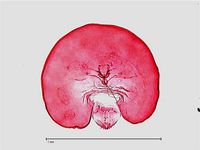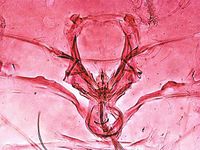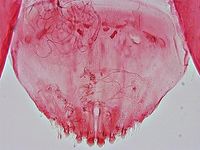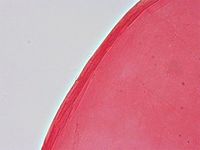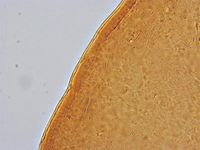Difference between revisions of "Aonidiella aurantii"
| (One intermediate revision by the same user not shown) | |||
| Line 1: | Line 1: | ||
{{TaxLinks|LnkAonidiella}} | {{TaxLinks|LnkAonidiella}} | ||
| − | {{ | + | {{LiteratureDBX|{{PAGENAME}}|869|browse,Ccountrylnk,Pcrops,AbenefialsN}} |
[[File:Aonidiella_aurantii_IPM5439740.jpg|250px|thumb|''Aonidiella aurantii'' male and female (click on image to enlarge it)<br/>Author(s): Dennis Navea<br/>Source: [http://www.ipmimages.org/browse/detail.cfm?imgnum=5439740 IPM Images]]] | [[File:Aonidiella_aurantii_IPM5439740.jpg|250px|thumb|''Aonidiella aurantii'' male and female (click on image to enlarge it)<br/>Author(s): Dennis Navea<br/>Source: [http://www.ipmimages.org/browse/detail.cfm?imgnum=5439740 IPM Images]]] | ||
| − | <font color="#800000">'''''Aonidiella aurantii'''''</font> (Maskell, 1879) - (citrus red scale) | + | <font color="#800000">'''''Aonidiella aurantii'''''</font> (Maskell, 1879) - (citrus red scale) |
| − | + | ||
| − | + | The scale is a wide-spread and polyphagous pest and attacks citrus, almond, grapevine, pear as well as other crops. Severe infestations cause leaf yellowing, dieback of branches and occasionally tree death. Light infestations on citrus cause cosmetic fruit damage with results in downgrading of the fruit quality. | |
| + | |||
| + | Biological control agents are very important and have been introduced into many countries, but have not always been sufficient in keeping the scales below an economic threshold. Some have to be regularly released. Insecticide applications need to be avoided as much as possible and should have minimal impact on beneficial agents like mineral and vegetable oils. | ||
{{VN | {{VN | ||
|en=citrus red scale<br/>California red scale | |en=citrus red scale<br/>California red scale | ||
| Line 13: | Line 14: | ||
|pt=cochonilha-roxa<br/>cochonilha-vermelha | |pt=cochonilha-roxa<br/>cochonilha-vermelha | ||
}} | }} | ||
| + | Dispersal of the scale occurs in the crawler stage by wind. In females the life cycle from the crawler stage (the eggs hatch internally in the female), through 2 nymphal stages, to the adult stage lasts about 6 weeks. | ||
| + | |||
The shield of the female is circular, brownish-red and 1½-2 mm in diameter. The male nymphs have a slightly smaller shield. The winged adult males only live for a few hours. | The shield of the female is circular, brownish-red and 1½-2 mm in diameter. The male nymphs have a slightly smaller shield. The winged adult males only live for a few hours. | ||
| Line 19: | Line 22: | ||
For details see the respective page in [[wikipedia:Aonidiella aurantii|Wikipedia]]. | For details see the respective page in [[wikipedia:Aonidiella aurantii|Wikipedia]]. | ||
| − | |||
Latest revision as of 21:24, 22 July 2022
| Literature database |
|---|
| 126 articles sorted by: |
| • year (descending) |
| • research topics |
| • countries/regions |
| • host plants |
| • list of natural enemies |
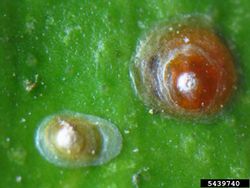
Author(s): Dennis Navea
Source: IPM Images
Aonidiella aurantii (Maskell, 1879) - (citrus red scale)
The scale is a wide-spread and polyphagous pest and attacks citrus, almond, grapevine, pear as well as other crops. Severe infestations cause leaf yellowing, dieback of branches and occasionally tree death. Light infestations on citrus cause cosmetic fruit damage with results in downgrading of the fruit quality.
Biological control agents are very important and have been introduced into many countries, but have not always been sufficient in keeping the scales below an economic threshold. Some have to be regularly released. Insecticide applications need to be avoided as much as possible and should have minimal impact on beneficial agents like mineral and vegetable oils.
| Vernacular names | |
|---|---|
| • Deutsch: | Rote Orangenschildlaus |
| • English: | citrus red scale California red scale |
| • Español: | piojo rojo de California |
| • Français: | pou de Californie |
| • Português: | cochonilha-roxa cochonilha-vermelha |
Dispersal of the scale occurs in the crawler stage by wind. In females the life cycle from the crawler stage (the eggs hatch internally in the female), through 2 nymphal stages, to the adult stage lasts about 6 weeks.
The shield of the female is circular, brownish-red and 1½-2 mm in diameter. The male nymphs have a slightly smaller shield. The winged adult males only live for a few hours.
Synonyms:
Aspidiotus aurantii
For details see the respective page in Wikipedia.
- Other images of Aonidiella aurantii (PaDIL - click to enlarge)
